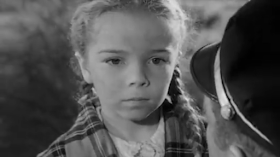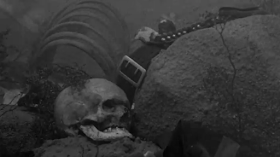"I got ants in my pants and I need to dance!" -- James Brown
It's been a while since I've seen Them! (1954, directed by Gordon Douglas). I didn't remember how hard it goes when generating its scares. I maybe never knew that it was intended to be framed in a moderate widescreen. I don't ever remember seeing the red and blue title card. The last time I saw the film was in the 1990s, maybe? I don't honestly recall. There's a lot of water under the bridge. The two things I did remember about the film are the sound of the giant ants and the blank expression on the little girl at the beginning of the film. That blank expression is terrifying.
The story finds two New Mexico state policemen finding a little girl wandering in the desert, just off the highway. She is catatonic and does not respond to the officers. A circling airplane spots what might be her family's vehicle a little farther up the road, a car with a camping trailer that has been demolished and no sign of the girl's family. There are odd footprints around the scene, however. Footprints that don't resemble any animal that the two cops have ever seen. Once the medics and forensic people arrive, Peterson and Blackburn, the cops, drive on further up the road, arriving at the local general store after sundown. They hope the store's owner can shed some light on what happened to the girl's family, but instead, they discover another mystery. The store has been demolished in like manner to the trailer. Peterson and Blackburn find gramps in the cellar, dead. Peterson leaves Blackburn to mind the store and await forensics while he drives back to headquarters to report his findings. Unfortunately for Blackburn, the entities that destroyed the store return. He doesn't survive the encounter. Peterson blames himself for Blackburn's death, but there's no time to fall to pieces. Moore, an FBI agent, arrives on the scene and he takes Peterson on as an investigative partner as they look for answers. Also arriving on the scene are the Medfords, a kindly old scientist and his scientist daughter. They have ideas of their own, given that the victims have been found injected with large quantities of formic acid. When the little girl is presented with a vial of formic acid, the smell of it shocks her aware and she screams "Them! Them!" Graham, Peterson, and the Medfords strike out for the desert looking for the culprits, whose coming is presaged by a strange tingling sound on the wind. It's Patricia Medford who first encounters the threat: an ant the size of a truck. Other gargantuan ants are spied roaming the desert. An aerial search locates their nest, around which is a pile of the bones of their victims. The Medfords and the military formulate a plan to gas the nest with cyanide after which our heroes brave the nest to burn out any survivors. They find the queen's egg chamber, which contains two empty eggs that Pat recognizes as having contained queen ants. There are more giant ants in the wind, and it becomes a race to find them. The military puts out a bulletin for information about strange encounters with flying anomalies. One of the queens, they find, has landed on a ship at port and hatched its eggs while the ship was at sea. The other queen is more elusive, until a report from a skid row derelict and a huge robbery of sugar points to Los Angeles, where the ants could be anywhere in the miles and miles of storm sewers...
Giant insects have been around the science fiction/horror myth pools for a while, predating the 1950s that were their heyday. H. G. Wells arguably founded the genre with "The Empire of the Ants," in which the ants are large, but not giant. The horror in that story was the idea that ants might become intelligent and found empires of their own with which human beings could not compete. Key to the idea behind the story is the notion that apart from human beings, ants are the only organism to wage war amongst themselves. Indeed, ants have warrior castes among them whose only purpose is to wage war on behalf of the nest. Such an idea must have been a nightmare to the colonial mind. Giant insects also figure in King Kong, in the fabled spider pit sequence that was cut from the film. Spiders aren't technically insects, as any reader of Spider-man will tell you, but they generate an atavistic horror in a similar vein. There's also "Leningen vs. The Ants," a short story by Carl Stephenson from 1938. In that story, the ants don't have to be giant (as with Wells) to pose an existential threat to its Brazilian plantation owner. More than the Wells story, it's the classic of the subgenre. It's was a minor subgenre, though. Or was a minor subgenre until the atom bomb sprinkled radioactive pixie dust on it.
The big bug movies of the 1950s represent a peculiar kind of societal anxiety in which the concerns of human beings are reduced in scale by the horrors of the atomic age. We are as less than ants, in this framing, which is not a new idea. It was key to Lovecraft's horror stories, in which vast entities are indifferent to humanity even as they destroy us. What the big bug movies did was make this literal, either by creating monsters of ordinary creatures by scaling them up to gargantuan size or by scaling human beings down, like Scott Carey in The Incredible Shrinking Man. Them! was not the first such film. The Beast from 20,000 Fathoms was similar, as was King Kong. The weird fiction writer, Caitlin R. Kiernan once described King Kong as a Lovecraftian narrative in which the big ape was the elder god of some long fallen and degenerate civilization. The wall on Skull Island could even be described as "cyclopean" in this framing. What was new in Them! was the way it puts its finger directly on the atomic bomb. The landscape is the desert near Los Alamos, and the elder Dr. Medford identifies radiation as the likely mutagen that produced the film's giant ants. The desert is where the horrors of the atomic age were born, and the desert is the landscape of 1950s science fiction. As existential threats go, giant ants are pretty effective even if they are a fantasy creature.(1)
The narrative structure of Them! acts as a template for the films that came after it: The first evidence of the monsters, the first encounter with the monsters, the expanding threat of the monster, the search for the monster, the final conflict of the monster, all in orderly succession. This formula strangles some of the films that follow Them!, but Them! gets a pass because it got there first. And Them! has an instinct for the jugular. That shot before they gas the first nest in which a rib cage comes tumbling down from the top of the mound only to come to rest in a pile of human skulls is strong stuff for a film from the 1950s. And the depiction of the little girl's trauma reaction is genuinely frightening. The ultimate fate of Sgt. Peterson when he's rescuing the two boys in the LA sewers is unusual, too, because he's arguably the film's protagonist (Graham seems a johnny come lately as a central hero). Them! is a film that takes the gloves off and goes to work with body blows. Them! also has superior special effects. Rather than use tricky opticals like Tarantula or The Incredible Shrinking Man, Them! builds full-sized monsters, which have a physicality that would elude even Ray Harryhausen. The characters and the monsters are in the frame together rather than composited in the lab, which sells the film's reality more than any other film of its type. The sound design helps. That weird buzzing that indicates the ants is a relative of the ticking of George Pal's Martian war machines and it lingers in the memory even decades later.
This has a relatively strong cast and well-defined characters, even if they occupy archetypes (or stereotypes, as the case may be). James Whitmore and James Arness are the lead heroes, Arness having been promoted from the monster role in The Thing. Edmund Gwenn has a touch of the fey as the elder Dr. Medford, not at all like the usual technocrats of the era. The image of Santa Claus lingers on him. Joan Weldon gets the thankless role of the younger Dr. Weldon, but unlike many such characters, she has knowledge and action to contribute. Her willingness to enter the nest after it's been gassed is bold for the era, and it's her knowledge that identifies the threat of the two fugitive queens. There are a couple of shots in this sequence that resemble Ripley in the egg chamber in Aliens, so it's an image that echoes down the years. For fans of mid-century film and TV, this is a parade of familiar faces, including William Schallert as an EMT (he would later appear in Joe Dante's MANT!, the film within a film in Matinee), Fess Parker as a witness who swears he isn't crazy because he really DID see a giant flying ant, Dub Taylor as another witness, and so on. This all provides the film with a texture that is unique, if only because the film's imitators usually didn't have the money for this kind of extended cast (Clint Eastwood's cameo role as the pilot who takes down the giant spider in Tarantula notwithstanding).
In all, Them! holds up better than I ever imagined after all this time. I was genuinely surprised at how much I enjoyed revisiting it, even though I probably should have known better. It's a classic for a reason, even if its imitators have taken some of the shine off. That's not the film's fault; it's a victim of its own success.
(1) I'm describing ants this size as fantasy creatures even though I'm aware that insects much larger than we know today once existed. The Earth has less oxygen in its atmosphere today than it did millions of years ago. Because of the way insects breathe, an ant the size of the ones in Them! would suffocate, even a million years ago. There's not enough oxygen to get into the insect's spiracles at that size (insects don't have lungs; they rely on air pressure and oxygen density to oxygenate their bodies). The only giant ant story I ever read that includes and obeys the scientific facts of giant insects is "giANTS!" by Edward Bryant.
This year's October Horror Movie Challenge has run it's course, but I have a long way to go in writing about it. I participated in my friend, Aaron Christensen's annual fundraiser during this year's challenge. Aaron chose the Women's Reproductive Rights Assistance Project as this year's recipient for our community's largess, so if you've got a few bucks lying around, here's a donation link for the donor drive. You know what to do.
I haven't kept up with blogging the challenge for various real-world reasons. I finished the challenge with 32 films total and 17 new to me films. If you want to see the total shake out, I posted a list at Letterboxd. I'll be posting reviews for a while in any event...
My total progress:
New to me films: 17
Total films: 31

This blog is supported on Patreon by wonderful subscribers. If you like what I do, please consider pledging your own support. It means the world to me.








No comments:
Post a Comment